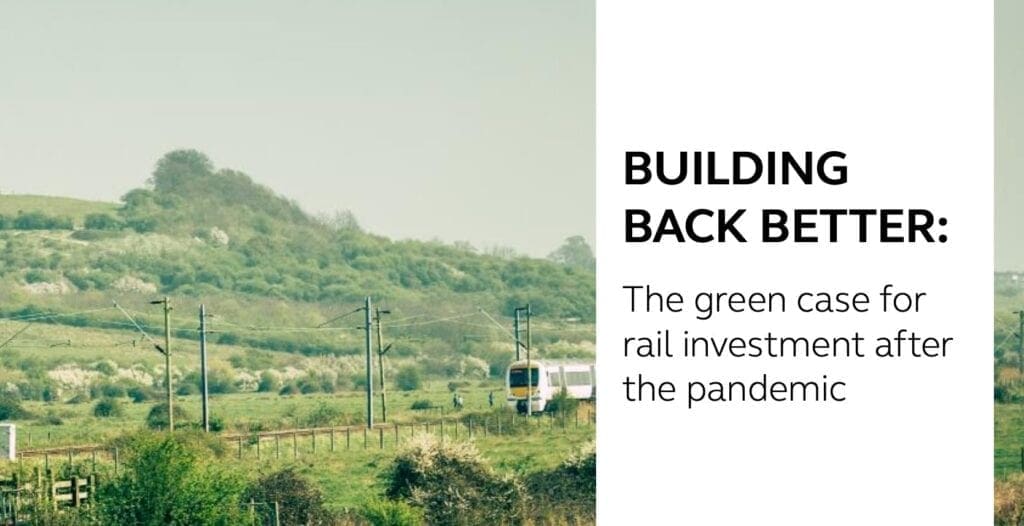
A new report from leading rail industry professionals calls for the government to put rail at the heart of a green post-pandemic economic recovery.
The Building Back Better report, written by industry experts from the High Speed Rail Group and the Rail Delivery Group, calls for major investment into high speed rail to drive growth and cut emissions.
The report was launched at an event during Labour Party’s virtual conference with Shadow Rail Minister Tan Dhesi MP.
Building Back Better tracks the history of major disruptive events on rail travel, from Spanish flu to SARS, finding that “in a world of constant change, rising travel demand appears to be one of the few certainties”.
With rail travel set to continue on this upward trajectory after the pandemic, the report forecasts an increasing focus on longer distance rail travel for leisure – for which high speed rail in particular is suited. To enable this shift, the Government should create a “green level playing field” for rail travel to become the green transport mode of choice.
Rail is already a low carbon mode of transport, accounting for only 1.4% of the UK’s domestic transport emissions. Building Back Better shows the role that high speed rail can play in increasing environmental gains further still, driving modal shift away from carbon-intensive cars and aviation.
The High Speed Rail Group says projects such as HS2 will have environmental benefits.
“HS1 demonstrates high speed rail as the clean transport solution, cutting the equivalent of 60,000 short-haul flights and slashing demand for short haul flights between London and Paris. With flights from Scotland to London a major market of domestic aviation routes in the UK, there are environmental benefits to be made by replacing these with improved connections into the HS2 network.”
Rail industry: Alarm bells ringing
Andy Bagnall, Chief Strategy Officer for the Rail Delivery Group which represents train operators, said: “The data is clear and should raise alarm bells, the country stands on the precipice of a car-led recovery from COVID-19 that risks dealing a knockout blow to the nation’s target of reaching net zero carbon emissions by 2050.”
Mr Bagnall’s comments follow reports from the European Environment Agency that the easing of lockdown measures has seen air pollution spike across Europe’s cities. In Britain, the latest figures from the Department for Transport show that growth in car use is out-stripping other modes of transport as people begin moving again.
From September 7-13, the number of cars and lorries on the road was almost back to normal with an average of 96% of pre-COVID traffic levels and exceeding pre-COVID levels at weekends. Conversely, the number of people using trains and buses remains a fraction of what they were before the pandemic at 39% and 57% respectively, despite work from transport operators to make the railway COVID secure.
As part of their Safer Travel Pledge, rail companies have increased cleaning on trains and at stations and are running longer services to facilitate social distancing. Early evidence from studies in Britain, France and Germany also suggests that the risk of transmission of COVID-19 onboard trains is very low due to measures as part of the pledge, such as regular cleaning, as well as ventilation systems and the requirement for people to wear face coverings.
The fringe event, hosted jointly by the rail industry and the High Speed Rail Group saw the launch of proposals on how the transport sector can be decarbonised and how rail can support a green recovery from COVID.
Mr Bagnall continued: “Rebuilding the fares system and making ticketing simpler is essential to get people out of traffic jams and onto cleaner, greener trains. We want to work with government to make this a reality.”
Projections from KPMG show that a simpler fares system that enables tap-in-tap-out travel across the country, tackles crowding on Britain’s busiest services and allows discounts on 80% of walk-up fares could increase the number of rail journeys by 300million over the next ten years cutting CO2 emissions by 1.2 million tonnes.
The Building Back Better report makes the following recommendations:
- A national high speed rail spine, which builds on the sustainable credentials of the railway while also creating jobs across the nation.
- Investment in low carbon infrastructure which will support a long term steady programme of electrification.
- More rail freight capacity to reduce carbon emissions and decongest the road network.
- Growing rail’s market share in the domestic long-distance market by improving connections between Scotland and the north of England to the high speed network.
- A reformed, up to date fares and ticketing system to incentivise more passengers to use the network.


